Mar 2009
Mar 2009 sadmin2009 CONFEDERATIONS CUP GUIDE TO BUYING YOUR CONFEDERATIONS CUP TICKETS
2009 CONFEDERATIONS CUP GUIDE TO BUYING YOUR CONFEDERATIONS CUP TICKETS sadminTickets for the Confederations Cup are sold in two phases. The first phase started in November last year and continues up to 31 March this year. 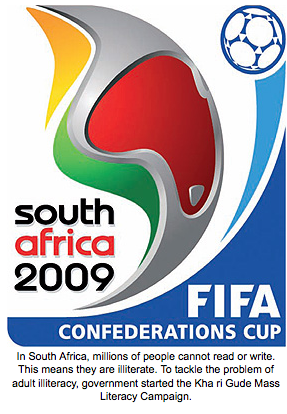 During this time, applications for tickets are sent to FIFA for processing on a first-come-first-served basis. But this depends on whether tickets are available.
During this time, applications for tickets are sent to FIFA for processing on a first-come-first-served basis. But this depends on whether tickets are available.
Types of tickets
The second phase is between 1 April and 28 June 2009. There are four types of tickets. Types one, two and three are sold in American dollars and are only for soccer fans living outside South Africa.
Type four tickets are for South African soccer fans only. These tickets are sold in South African Rand.
Soccer fans from other countries wanting to buy tickets will have to buy them through the FIFA website www.FIFA.com.
South African soccer fans can buy their tickets at FNB outlets throughout the country or through the website. Each ticket is numbered to identify a specific seat. Each ticket holder must sit in the seat allocated to the particular ticket.
A limited number of tickets are available for people in wheelchairs. These are only for persons who have a disability and are unable to attend matches without using a wheelchair. All wheelchair users applying for tickets must say specifically that they need wheelchair tickets. People who buy wheelchair tickets will get an extra ticket free of charge for the person who accompanies them.
Personal details
When you apply for a ticket, you must give your first name, surname, date of birth, nationality, passport reference number or SA identity document (ID) reference number, contact details (e-mail or telephone), postal address (no PO Box) and payment details.
- Mbulelo Baloyi
Matches - when and where?
Group A: South Africa, Iraq, New Zealand, Spain
Group B: United States of America, Italy, Brazil, Egypt
Group stage matches, times and venues
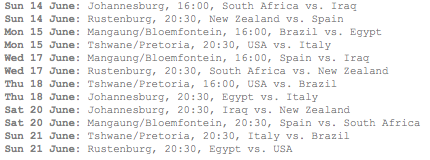
Semi-final 1:
Wednesday 24 June 2009, 20:30, Bloemfontein
1st in Group A vs. 2nd in Group B
Semi-final 2:
Thursday 25 June 2009, 20:30, Ellis Park Stadium (Johannesburg)
1st in Group B vs. 2nd in Group A
Third-place play-off:
Sunday 28 June 2009, 15:00, Rustenburg
Loser semi-final 1 vs. loser semi-final 2
Confederations Cup Final:
Sunday 28 June 2009, 20:30, Ellis Park Stadium (Johannesburg)
Winner semi-final 1 vs. winner semi-final 2
2010 WORLD CUP A LEGACY FOR THE FUTURE
2010 WORLD CUP A LEGACY FOR THE FUTURE sadminMany street children are bright, talented and eager to learn, but don't have opportunities to develop their skills. For some of them this is about to  change. Two of the 2010 host cities have programmes in place to help street children learn new skills.
change. Two of the 2010 host cities have programmes in place to help street children learn new skills.
Skills programmes for street children are among the 2010 legacy projects. This means they have benefits for 2010, while also leaving a legacy for the future.
The aim with skills training for street children is to empower them and help them to be role models for other street children.
The performing arts programmes will teach them skills in singing, dancing and acting. Although the programmes focus mainly on children, adults will also be included.
Performing arts
Cape Town started its Performing Arts Development Programme at the end of last year. It co-operates with non-governmental organisations and other levels of government that care for street people.
The programme is already planning a concert with the children performing in an orchestra. Some children will learn to play musical instruments made from items that have been thrown away, while others will sing and dance to the music. These are skills that they will be able to use for the rest of their lives.
Training
Organisations like the Zip Zap Circus School, Dance for All, Ikapa Dance Theatre Productions, Tercia Kindo Arts, Jikeleza Dance Project, the Cape Dance Company and the Athlone Academy of Music will help with training. They will work in co-operation with the Cape Town Symphony Orchestra.
The City of Cape Town has also appointed an experienced trainer in dance, movement therapy and youth development work to train and guide the group from rehearsals to the final performance.
In the next few months, they will be working towards getting ready for performances during the World Cup in 2010.
"Grow 2010"
In Durban, a similar programme called "Grow 2010" was started. The project is aimed at building an orchestra for the 2010 Soccer World Cup using homeless children in shelters. It will teach them to play musical instruments to perform at different events during the Soccer World Cup in 2010. "Grow 2010" is short for Grass Roots Orchestra 2010.
Umthombo, a Durban-based non-governmental organisation working with street children, said the 2010 Soccer World Cup will be an important event to show how street children are treated in South Africa.
The World Cup does not have to be a disaster for street children, Umthombo said. With well thought-out plans and a caring outlook, the soccer tournament could help them to improve their lives.
- Mbulelo Baloyi
2010 WORLD CUP VIEWING PROGRESS FROM THE TOP
2010 WORLD CUP VIEWING PROGRESS FROM THE TOP sadminAS the final piece of Durban's Moses Mabhida Stadium's beautiful arch was recently lifted into place, a large crowd saw the historic event from  the stadium's visitors' centre. Visitors' centres operate side by side with construction. They give visitors an opportunity to watch the stadium's progress and see a different view of the city.
the stadium's visitors' centre. Visitors' centres operate side by side with construction. They give visitors an opportunity to watch the stadium's progress and see a different view of the city.
Of the ten 2010 Soccer World Cup stadiums, the Durban stadium and Cape Town's Green Point stadium have visitors' centres. They are operating side by side with construction.
The Green Point stadium's new visitor centre was opened in December 2007. Durban's Moses Mabhida Stadium's visitors' centre was opened in January 2008.
Plans and progress
The Moses Mabhida Stadium visitors' centre keeps people informed about plans and progress ahead of the World Cup. This includes information about the stadium's design and construction, as well as other 2010 plans.
Visitors to the centre can watch construction from the upper viewing deck.
This stadium, with its beautiful modern arch standing out above the city, is the only one which can host events like the Commonwealth Games and the Olympic Games.
Schools
Schools are encouraged to bring learners to the centre to share in the excitement of the build-up to 2010. The centre makes construction and development more understandable to them and gives them information on the types of careers offered in the construction industry.
Wheelchairs
The visitors' centre is also accessible to people in wheelchairs. The centre is open to all and entry is free. Groups of more than 10 people should make an appointment to avoid crowding.
Tourist attraction
The Green Point Stadium's Visitor Centre is already a popular tourist attraction. It allows visitors to see the construction site and progress of the stadium from a viewing platform. It also gives opportunities for learning about the building process.
The centre has an audio-visual facility, an exhibition of soccer-related items and a model of the stadium. It also has a 150-seat auditorium and a boardroom.
The centre is open to all. But there is an entrance fee of R40 for adults and R20 for students and pensioners.
- Mbulelo Baloyi
ALL SET FOR KICK OFF...
ALL SET FOR KICK OFF... sadminThe Confederations Cup host cities are buzzing with activity as they are getting ready for the games. Stadiums to be used for the Confederations  Cup are Ellis Park in Johannesburg, Loftus Versfeld in Pretoria/Tshwane, Mangaung/Bloemfontein's Free State Stadium and the Royal Bafokeng Sport Palace in Rustenburg.
Cup are Ellis Park in Johannesburg, Loftus Versfeld in Pretoria/Tshwane, Mangaung/Bloemfontein's Free State Stadium and the Royal Bafokeng Sport Palace in Rustenburg.
Ellis Park
The City of Johannesburg will host the opening match and final of the Confederations Cup. The upgrade of the stadium is complete and the team is very happy with the work that has been done.
All that still needs to be done is cleaning up and upgrading the areas around the stadium to get it ready for the thousands of fans expected for the Confederations Cup, as well as the 2010 World Cup.
Opening round matches to be played here are South Africa against Iraq, Italy against Egypt, and Iraq against New Zealand.
Bloemfontein
Work on the Free State Stadium, which was falling behind schedule, is now well on track and will be completed on time. The major work on upgrading the western grandstand has increased the stadium's seating from 38 000 to 45 000.
Opening round matches to be played at the stadium are Brazil against Egypt, Spain against Iraq and South Africa against Spain.
Rustenburg
Upgrading the Royal Bafokeng Stadium is progressing well. By the end of February, 95 per cent of the stadium had been completed. A new access road to the stadium will be completed by April and work on a media centre is almost complete.
Opening round matches to be played here are New Zealand against Spain, South Africa against New Zealand and the USA against Egypt.
Pretoria/Tshwane
Upgrading of Loftus Versfeld stadium is complete. The roof over the eastern pavilion was the single biggest job.
Opening round matches to be played include a clash between Italy and Brazil on 21 June. It has sold more tickets than any other game in the tournament so far.
Other opening round matches to be played here are the USA against Italy and the USA against Brazil.
- Muzi Mkhwanazi
BUILDING HAND-IN-HAND WITH GOVERNMENT
BUILDING HAND-IN-HAND WITH GOVERNMENT sadminThe Itshokolele Community Project started as a community saving scheme in 1998. Members of the scheme saved money and offered loans to 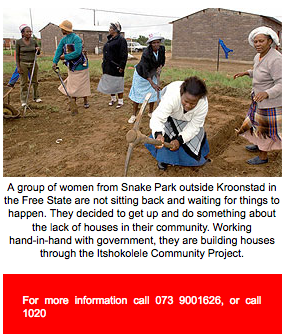 people who wanted to build their own houses. The loans ranged from R1 000 to R3 000.
people who wanted to build their own houses. The loans ranged from R1 000 to R3 000.
Because most of its members were unemployed and some elderly, many couldn't afford to repay the money.
Government
Amelia Nakeli, a proud house owner and a co-ordinator of the Itshokolele Project, said they then approached government for financial help.
They were asked to make a list of all the people who needed houses. The list had to be handed to the local municipality, who checked it and approved funding to build the houses.
Applicants whose grants were approved got about R45 000. Apart from the housing grant, they also got land to build on. Fifty grants were approved.
The housing grants are not given directly to members, but are regulated by an independent company that manages the fund. The community members order building materials and forward their receipts to the company. The company then pays the suppliers and builders.
So far, 39 houses have been completed. The outstanding 11 houses are in the process of being built.
Save money
Instead of the community using a construction company, they decided to build their own houses with the help of local builders. In this way they not only save money, but create jobs.
They also save money through things like not plastering the houses inside and not fitting bathtubs. They agreed that the owners of the houses would add these items later when they could afford it.
During construction, members of the project help the builders by digging foundations, passing on bricks and mixing cement. This ensures speedy completion of the houses while also cutting costs. Members of the project are not paid for their services.
Loans
The Itshokolele Project, which started with only a few members, has grown a lot. Hundreds of people who need houses are now joining them, Nakeli said.
Project members are still continuing with the savings scheme. The money is used for loans to house owners to improve their houses.
"We are proud of ourselves and grateful to our government. The houses show that working hand-in-hand with government nothing is impossible." Nakeli said.
- Muzi Mkhwanazi
CHILLIES AND PAPRIKA GOT THEM OUT OF POVERTY
CHILLIES AND PAPRIKA GOT THEM OUT OF POVERTY sadminDepending on the season, Ernest Gwala, from Mandeni in KwaZulu-Natal, planted maize, potatoes and dry beans to feed his family. He was 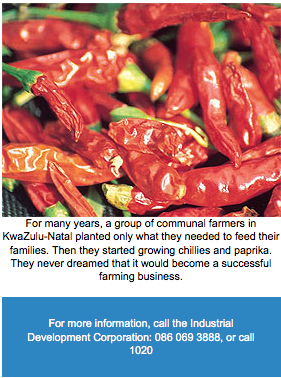 working with a group of farmers from the Mathonsi Divine Co-operative in Mandeni. When the crops were harvested and they had enough for their families, they sold what was left during pension pay-out days.
working with a group of farmers from the Mathonsi Divine Co-operative in Mandeni. When the crops were harvested and they had enough for their families, they sold what was left during pension pay-out days.
Test basis
It was only in the late 1990s that the farmers started planting chillies and paprika on a test basis.
"The local agricultural advisers encouraged us to plant chillies and paprika. They said we could make some money as there was a demand for this product," Gwala said.
With help from the Ilembe District Municipality and the provincial Department of Agriculture and Environmental Affairs, the farmers began farming chillies and paprika on a full-time basis.
Markets
The Ilembe District Municipality started looking for markets where the three local co-operatives could sell their products. They are Khelelani Community Trust in Maphumulo Local Municipality, the Bulwer Farm in KwaDukuza and the Mathonsi Divine in Mandeni. More than 250 small-scale farmers belong to these co-operatives. Most of the members are women.
The Ilembe District municipality also helps the communal farmers to deliver their produce to African Farms agricultural-processing plant in Glen Anil, north of Durban. Here the chillies and paprika are processed and turned into products. They then find their way into supermarkets all over the country.
Exports
The planned opening of the Dube Trade Port in La Mercy is a possible export opportunity for these farmers. The municipality also plans to set up an agricultural processing plant and a pack house.
Gwala said the planned agricultural processing plant would help them to add value to the produce like making chilli sauces. There will also be a storage and ripening room, as well as a pre-packaging room.
"Since we started growing chillies and paprika, we have had a regular income. With chillies and paprika we don't have to wait a long time before we harvest," he said.
Spice Growers Association
The KwaZulu-Natal Spice Growers Association supports the co-operatives. The Association was started in 2002 to look into the problems faced by small-scale farmers in the production and marketing of their products.
The Association is now helping more than 230 small-scale farmers in other areas of KwaZulu-Natal who are growing paprika, chillies and garlic. Through the Association's Agricultural Tourism Programme, small-scale farmers are linked with supermarkets, hospitals and hotels where they can sell their products
- Mbulelo Baloyi
CO-OPERATIVE FARMING FROM SORGHUM TO OILS FOR PERFUMES
CO-OPERATIVE FARMING FROM SORGHUM TO OILS FOR PERFUMES sadminA group of 145 farmers in Nkandla, KwaZulu-Natal, started a co-operative called the Nkandla Herb Growers group in 1999. For the past nine 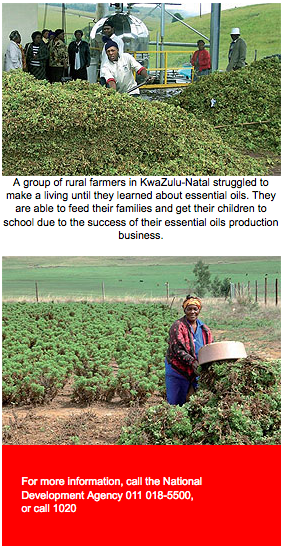 years, they have been running this fast-growing business on 10 hectares of land. It will soon grow to 40 hectares owing to extra land they got from the local Nkandla Municipality. This will help them increase their production of essential oils.
years, they have been running this fast-growing business on 10 hectares of land. It will soon grow to 40 hectares owing to extra land they got from the local Nkandla Municipality. This will help them increase their production of essential oils.
Essentials oils are taken from herbs and used in perfumes, bath foams and massaging oils.
Community Trust
The Nkandla Herb Growers is run by a community trust called Ikusasalethu Trust. "We are all benefiting from growing herbs because there is a huge demand for the oils we produce," said Trust chairman, Mr Henry Mahlobo.
He said the local farmers started farming essential oils after an international non-governmental organisation told them about it. The organisation was working on anti-poverty programmes in the area. The local small-scale farmers used to farm maize meal, beans and sorghum, but stopped because of the high costs of farming. They were advised to change to essential oils as the costs were low and harvesting is done three times a year.
Funding
"In 1999, we came together as farmers, mainly women. Tests with different herbs showed that Rose Generium and Rosemary were most suitable for farming in this area," Mahlobo said.
After harvesting their product, they had to transport it to a commercial farmer who owned a distillery near Melmoth. Because this was very expensive, the Nkandla Herb Growers asked for support from the National Development Agency (NDA) and the local municipality.
The NDA gave money to build a distillery plant in the Nkandla. The Nkandla Local Municipality donated extra land to the farmers. They also got funding from the Uthungulu District Municipality.
In addition, they got support from the provincial Department of Economic Development and funding from the Gijima Fund.
Gijima is a local economic development programme funded jointly by the European Union and the KwaZulu-Natal Provincial Government.
Seedlings
The herb growers are now supplying herbs to four local companies. Two of these companies are in KwaZulu-Natal, one in Gauteng and another one in Cape Town.
"We are now growing our own seedlings and selling them to essential oils farmers from outside Nkandla," Mahlobo said. "We also have our own plant where we distil the product, put it in bottles and label it." Distilling means the oils that are in the plants are taken out of the plant so that it can be bottled.
- Mbulelo Baloyi
CO-OPERATIVE FARMING SUCCESS COMES VIA PEANUTS
CO-OPERATIVE FARMING SUCCESS COMES VIA PEANUTS sadminA group of young people are using their business and farming skills to help the economy grow, develop skills and create jobs. From a small 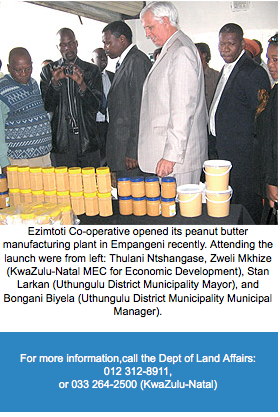 beginning they started a business with funding from government. Different government agencies have helped them with training in business management skills.
beginning they started a business with funding from government. Different government agencies have helped them with training in business management skills.
EIGHT youths from Kwa-Mbonambi in KwaZulu-Natal are showing that young people can be successful farmers.
After finishing school, the group of five men and three women, couldn't afford to study at tertiary institutions. But they were strong-minded about making a success of their lives. They decided to form a co-operative business. This is how the Ezimtoti Agricultural Co-operative came about in 2005. A co-operative is a group of people who get together to form a business. As a group they are in a better position to get funding.
Farm
The Ezimtoti Agricultural Co-operative now has a 285-hectare farm called Bonavista Farm in the Uthungulu District.
The farm is used for planting sugar cane and peanuts, as well as fruit. They use organic farming methods, which means they are not using pesticides and chemicals in their crop production. The co-operative was able to buy the farm through the Land for Redistribution and Agricultural Development (LRAD) programme of the Department of Land Affairs.
They recently opened a peanut butter manufacturing plant in Empangeni. The co-operative also set up a carbonated soft drink plant and they produce animal feed and peanut oil.
Supermarkets
The co-operative has talked to the KwaZulu-Natal Health Department about supplying peanut butter to some of the province's hospitals. This was done in co-operation with the provincial Department of Economic Development.
"We also had talks with two major national retail supermarkets because we want to supply our products to as many buyers as possible," said founder member and Ezimtoti marketing manager, Thulani Ntshangase.
Learnerships
The co-operative helps to develop skills by taking young unemployed graduates for learnership programmes. "We give internships for students to help them develop their business management skills. At the same time we are creating job opportunities," Ntshangase said.
They also teach small-scale farmers about organic farming.
Trade Port
The co-operative recently got an export permit from the Department of Trade and Industry (DTI). This means they can sell their products to countries outside South Africa. They will do this with the help of the new Dube Trade Port, which will handle the exporting of local products.
The Trade Port is being built near the new airport at La Mercy, north of Durban. It will open its doors next year
- Mbulelo Baloyi
CREDIT CARTOON START THE YEAR ON A GOOD CREDIT NOTE
CREDIT CARTOON START THE YEAR ON A GOOD CREDIT NOTE sadmin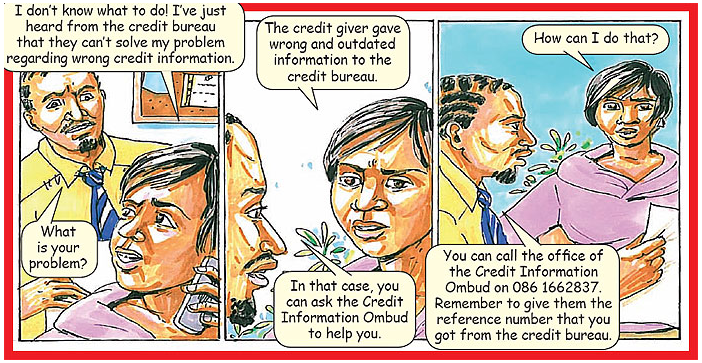
Do you have a problem with your credit profile, or with wrong information on the credit giver's records? Have you tried to solve the problem  without success? Don't give up - there is a way out.
without success? Don't give up - there is a way out.
If you have a problem with your credit profile or if you have been wrongfully blacklisted, you can get help from the Credit Information Ombud free of charge.
Reference number
Getting help from the Credit In-formation Ombud is one way of making sure that you start this year on a good credit note. But remember, the Credit Information Ombud can only help you after you have tried to solve your problem with the credit bureau first.
When you go to the Credit Information Ombud, you must use the same reference number you got when you reported the problem to the credit bureau.
The Credit Information Ombud can help you if:
- wrong default information is listed on your name. (Defaulting means failing to pay your debts as agreed with the credit giver).
- the credit information listed on your name is not complete;
- the credit information listed on your name is outdated;
- the credit giver has given incorrect information to the credit bureaus;
- the credit giver did not let you know that they would be listing you negatively;
- you defaulted on your debt through no fault of your own and you have since improved your credit profile;
- you were listed more than once for the same debt;
- you have been listed as a result of identity theft; or
- you have been listed due to a service dispute.
The Act also says that credit-givers must give people 20 working days before they can be blacklisted at the credit bureau.
- Muzi Mkhwanazi
Cholera advice: Simple ways to beat the disease
Cholera advice: Simple ways to beat the disease sadminA number of cholera cases have been reported in the country lately. The disease can be prevented and treated successfully, but if it is left 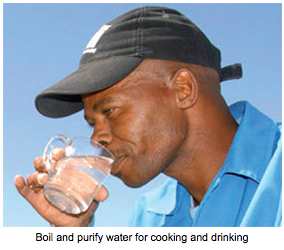 untreated, it can cause death. Applying simple hygiene rules can save lives.
untreated, it can cause death. Applying simple hygiene rules can save lives.
Water and food infected by cholera germs was probably the main cause of the outbreak of cholera in the country. A lack of proper water supplies and poor hygiene in certain areas added to this.
Most of the reported cases and deaths were in Mpumalanga and Limpopo. Cases have also been reported in Gauteng, the Northern Cape, KwaZulu-Natal, the Free State and the Eastern Cape.
People living in areas where these cases have occurred are urged to be extra careful to avoid getting the disease.
Response teams
The Department of Health is doing everything it can to prevent the disease from spreading. It has sent trained cholera outbreak response teams to help the provincial authorities in the worst affected areas. The department is also setting aside 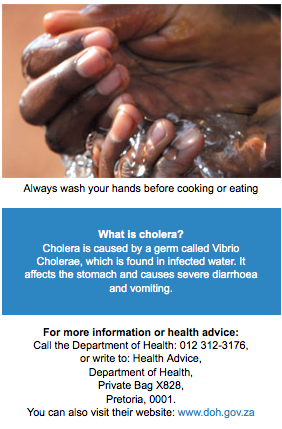 extra money to help fight the disease.
extra money to help fight the disease.
In addition, the department is working together with other departments to check water quality and to ensure safe water supplies and sanitation.
Medical volunteers in the private health sector have also been asked to help treat cholera patients.
Educate
Government has already educated hundreds of people, especially in the worst affected areas, about preventing and treating the disease. In co-operation with the provincial health departments, officials have gone to schools, churches and community organisations to teach people about the dangers of cholera.
Door-to-door visits
In Mpumalanga, the health department started an intensive health education programme. It includes door-to-door visits and handing out thousands of stickers and leaflets about cholera.
They have also been helping people to purify water in the affected areas by handing out about five million millilitres of Jik and more that 16 000 packets of chlo floc disinfectant.
How are people infected?
You can get infected if you:
- drink unpurified water that contains cholera germs
- eat food infected with cholera germs
- eat food with unclean hands
- use infected water for household purposes like washing and cooking
- have contact with an infected person's stools or infected bedding
- wash clothes which contain the cholera germ in a river or throwing infected water into the main sources of water like rivers or dams.
Guidelines
The National Institute for Communicable Diseases reviewed its cholera guidelines to ensure that it deals with this and future outbreaks of the disease. The guidelines are sent to the health departments of all the provinces.
The Hospital Association of South Africa also set up a cholera desk to help contain the spread of the disease.
How can I prevent cholera?
- Wash your hands after using the toilet
- Wash your hands after changing your baby's nappies
- Wash your hands before cooking
- Boil and purify water for cooking and drinking
- Wash fruit and vegetables thoroughly before eating
- Store purified water in a clean container and keep it covered
- Keep food covered
- Do not play or swim in or use water from streams, rivers and dams
- Cook fish thoroughly before eating
What are the signs of cholera?
Signs of cholera include:
- Severe watery diarrhoea. This means the patient has a runny stomach, which cannot be controlled.
- Nausea, which leads to vomiting and muscle cramps.
- Dehydration. This means the body loses water, natural salts and other nutrients because of diarrhoea and vomiting. It can range from mild to severe and can lead to coma and even death within a few hours.
How to purify water
- Boil water for at least ten minutes and leave to cool before drinking.
- Add one teaspoon of bleach to 25 litres of water and mix well. Leave the water in the container overnight or for at least for two hours before using it. If little water is needed for use immediately, add five drops of bleach to one litre of water and leave for half an hour before using it.
Treatment of a patient
- Anyone who shows any signs of cholera must visit a hospital or clinic as soon as possible for treatment. Treatment involves replacing the fluids and salts lost through diarrhoea and vomiting.
- As an emergency measure at home, you can mix one litre of clean, cooled, boiled water with eight level teaspoons of sugar and half a teaspoon of salt.
- Give the patient as much of this mixture as possible, at least two cups after each stool.
- Muzi Mkhwanazi
FOOD FOR WASTE PROGRAMME CLEAN-UP PUTS FOOD ON THE TABLE
FOOD FOR WASTE PROGRAMME CLEAN-UP PUTS FOOD ON THE TABLE sadminWhen Makhoszane Gwala lost her job four years ago, she struggled to survive. But since she got involved in the Siyazenzela Food for Waste 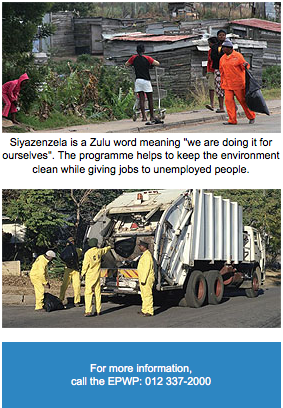 Programme, she is able to support her four children.
Programme, she is able to support her four children.
Single mother
Gwala is a single mother of four and lives in Jika Joe Informal Settlement in KwaZulu-Natal. She used to rely on the child support grant for her youngest child to feed her family. But the Siyazenzela project changed her life. "Since I started working on the project, I don't have to worry about where my next meal will come from," she said.
Municipalities
Siyazenzela was started on a trial basis in the villages of Masenenge, Mkholombe, Bhobhoyi and Louisiana outside Port Shepstone in KwaZulu-Natal.
Bigger municipalities like Msunduzi Municipality in Pietermaritzburg and eThekwini Metro have joined the programme too. It has also been started in the Eastern Cape and the Fetakgomo Municipality in the Sekhukhune District in Limpopo.
Fighting poverty
The aim of the programme is to keep the environment clean, while at the same time fighting poverty. In exchange for collecting waste and cleaning up their communities, people get food parcels every second week. The parcels contain basic items like rice, flour, maize, beans, sugar, salt, tea, soap and vegetables.
At the end of every month, the workers get food vouchers.
Work opportunities
The Food for Waste Programme was started in 2007 by the Department of Public Works as part of its Expanded Public Works Programme (EPWP).
The programme was copied from a very successful waste-collection project in a town called Curitiba in Brazil, South America.
It is based on the idea of hiring communities to collect and deliver household waste to a common spot. The local municipality collects the waste in exchange for food parcels. It is then taken for recycling. Recycling means waste materials are used to create new products.
Beneficiaries
Each area has 50 beneficiaries who collect the waste. This includes two supervisors.
The beneficiaries work in pairs of two in an area that has been chosen for them. They are given uniforms and working tools.
They do door-to-door collection of waste from households, pick up litter within their areas, sweep the streets and generally keep the area clean. On collection day, they deliver all the waste from their working area to the collection point.
Training
The workers are employed for 12 months. The condition of employment is that they must agree to attend training courses offered by the municipality involved in the Food for Waste Programme. This helps to develop their skills.
- Mbulelo Baloyi
FUN PAGE JOIN IN THE SOCCER FEVER...
FUN PAGE JOIN IN THE SOCCER FEVER... sadminMaze + Fill in the missing words
Print the image below to complete this game...

CLICK HERE FOR THE ANSWERS
Spot the Differences

CLICK HERE FOR THE ANSWERS
KEEPING IT BRIEF
KEEPING IT BRIEF sadminMPUMALANGA
The provincial government will this year meet its new target of completing 13 682 housing units. In addition to speeding up the delivery of incomplete houses, the province will also complete 1 131 emergency houses. More than 800 of the emergency houses have been built in the Bushbuckridge Municipality, an area of the province that was hardest hit by heavy storms experienced in the area.
- BuaNews
GAUTENG
The provincial department of social development has set aside money to fund 200 Early Childhood Development centres this year. It will help the department take care of 10 000 more children. The centres form part of the department's drive to improve the lives of children living in the province. To date, it has offered free school uniforms to 227 000 children entering grade one.
- BuaNews
LIMPOPO
The province's Department of Local Government and Housing handed over 1 800 homes to needy families in Marapong Extension 4. The houses form part of a R81 million housing project. It aims to reduce the housing shortage and eradicate informal settlements in and around Lephalale. The local community benefited during the construction of this project with over 2 000 jobs where both skilled and unskilled labourers were employed.
- BuaNews
KWAZULU-NATAL
The Football Development and Crime Awareness Programme was started in February to help reduce crime in the north of Durban. The programme, rolled out in Intuzuma, KwaMashu and Inanda (INK), aims to encourage youth to play soccer instead of doing crime. It follows a partnership between the eThekwini Metropolitan Municipality, the South African Police Service (SAPS), English Premiership Club Charlton Athletic FC, British Airways and the United Kingdom Metropolitan Police.
- BuaNews
FREE STATE
A new machine, called a Symbia T scanner, will go a long way to improve service delivery at the Universitas Hospital in Bloemfontein. Universitas is the first academic hospital in the country to get this high-technology machine. Some of the benefits are that it can study a wide variety of diseases in all the organ systems of the human body. These include the brain, heart, lungs, kidneys, liver, spleen and skeleton.
- BuaNews
NORTH WEST
To help grow the province's economy, the provincial government is focusing its attention on skills development this year. More than 252 Adult Basic Education and Training (ABET) centres were started between 2004 and 2008. They form part of efforts to reach a 100 per cent literacy rate in the province. Literacy has already improved from 57,1 per cent in 1996 to 66 per cent in 2007. But there are still almost 700 000 people older than 20 who have not completed Grade 7.
- BuaNews
LETTERS TO THE EDITOR GIVE US A PIECE OF YOUR MIND
LETTERS TO THE EDITOR GIVE US A PIECE OF YOUR MIND sadmin
WINNING LETTER
Opportunity knocks but once
It is high time for every South African to use the once-in-a-lifetime opportunities the 2010 World Cup is bringing to our country for our own  benefit.
benefit.
It is bringing many visitors from many nations to South Africa. So let's get together and create small clubs to run our own businesses, grow vegetables, start poultry farming, or centres to design and make cultural clothes, or make beautiful things from grass and trees that will attract tourists. We can beat poverty by making money from this.
For the youth who walk around in the streets doing nothing and unemployed people, it's never too late to change your mindsets. Let us all make a difference to our lives and benefit from 2010
- Makhala Morasenyane, Lindley, Free State
Crime leads to jail and death
Thumbs up to the South African Police, especially crime units, for fighting ATM bombings. To crime planners and crime doers, you better think twice and change your minds. Criminals, don't fool yourselves by enjoying short-cuts to "success". There is no future in doing crime, the wages of doing crime is jail or death.
Let us all unite and work hand-in-hand with government in fighting crime. Let us stand up and do things right for ourselves instead of robbing others of their belongings.
- Zola Galela, Adelaide, Eastern Cape
Never fail to try
It's sad how some young people have given up on life, while others are still on a mission to fight for what they believe is rightfully theirs.
I'm 25 years old and I am working hard to fulfil my dreams. It's a long journey. You may feel that you are going nowhere and it is taking too long, but you will reach your destination as long as you don't end the fight before it is won. Nothing is impossible. A wise man once said, "Never fail to try, rather fail knowing that you have tried."
- Kenneth Mokone, Boleu, Mpumalanga
Don't let failure stop you
Many people in South Africa find themselves unemployed and struggling in life and blame it on failure. This has never been an issue to many successful people.
People have to stop blaming their circumstances and learn to strive hard to overcome life's challenges. If you trip and fall, get up, look back and evaluate your steps, then try again! Stop using "if only..." as an excuse. Don't worry if you are not the best. What matters is that you have done your level best.
- Ntjabane Nthatisi, Phuthaditjhaba, Free State.
Tolerance creates peace
Human dignity can only be maintained if we are all tolerant towards each other. The world belongs to all human beings of different cultures and personalities.
Accepting each other as fellow humans belonging to only one human race, will make this world a much better place to live in. Tolerance is one of the smoothest avenues towards everlasting peace in the world.
- Abraham Pitso, Kereng, North West
South Africa belongs to all who live in it
For the past years, South Africa has been known as a country of peace and unity. But the year 2008 will be remembered as the year of xenophobia. Unfortunately, it is still happening in some places.
Why can't we accept that we South Africans are the "rainbow nation"? We should accept whoever lives in our country. They came here because they thought they would be safe. Why can't we be one big family and work together to create peace in our land.
- Barbara Luvhengo, Mungomani, Limpopo
You came to my rescue
I have always wanted to follow a career in teaching, but had no money or a bursary. Your November issue really helped me a lot. After reading it, I called 1020 and they gave me info on how to contact universities. So thanks to you, I am glad to report that I am admitted to the University of Limpopo and got a Funza Lushaka bursary.
I often do some part-time teaching for ABET and it was difficult for me to teach them about cabinet ministers and deputies. To my rescue I have found a list and photos of all the Cabinet ministers and deputies. We are now up to date with the recent changes.
Keep up the good work and inform us about changes, developments and transformation in our beloved country.
- Ernest Leboho, Lebowakgomo, Limpopo
A great job
I love your magazine. It feeds me with important information and ideas. I am now able to assist people around my village with information concerning grants, bursaries and training that government provides. You're doing a great job and I can't wait for the next issue.
- Sibonelo Mbatha, Rorkes Drift, KwaZulu-Natal
They deserve love
We must deal with HIV and Aids as an illness like any other. It is not a death sentence. But we must be strong and stand together to fight it by living healthy life styles, taking precautions and taking medication. I've seen people die from it and this has given me more understanding for those who suffer from it. It surprises me to see that there are still people who laugh and tease those affected and infected by HIV and Aids. Please guys, let's just give them the love and respect they deserve.
- Nakedi Makgobatlou, Ramokgopa, Limpopo
Clean up and beat poverty
Let's stop throwing rubbish around all over the place. We know littering is the wrong choice. We know that dumping rubbish is polluting our land and it's not good for our health, it can make us sick.
Why don't we rather clean up our land and make money by collecting rubbish to recycle. Let's collect plastics, paper, bottles and cans and sell them to recycling companies.
- Tsholofelo Nkadimeng, Dennilton, Gauteng

MILLIONS HAVE REGISTERED TO VOTE
MILLIONS HAVE REGISTERED TO VOTE sadminThere are 23 million South Africans registered to vote in the provincial and general elections set for 22 April 2009. This number, says the 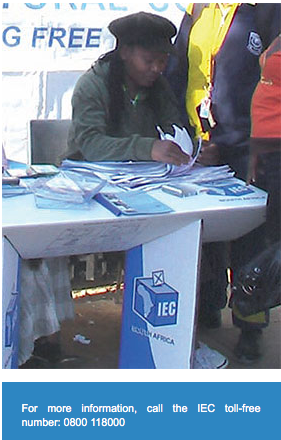 Independent Electoral Commission, exceeds the target it had set itself of registered South Africans listed on the voters roll.
Independent Electoral Commission, exceeds the target it had set itself of registered South Africans listed on the voters roll.
The final registration weekend has led to a 3,16 million increase in the number of registered voters. The voter's roll now contains the names of just more than 23 million voters.
A total of 1 508 642 new registrations were recorded over the last registration weekend. Of these, 78,3 per cent were from South Africans younger than 30 years old. A further 1 653 216 voters corrected their details or re-registered in a new voting district.
- BuaNews
OPPORTUNITIES FOR DISABLED MAKING A DIFFERENCE TO MANY LIVES
OPPORTUNITIES FOR DISABLED MAKING A DIFFERENCE TO MANY LIVES sadminFinding a job is not always easy. If you are physically disabled it's even a bigger hurdle. Government has passed laws encouraging employers to 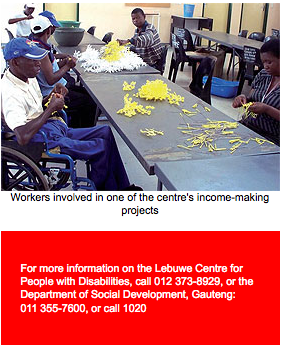 hire disabled people, but many are still left to survive on their own.
hire disabled people, but many are still left to survive on their own.
People with disabilities don't have to feel left out because they have no skills. There are institutions that care about them, develop their skills and help them to make a living.
The Lebuwe Centre for People with Disabilities in Atteridgeville, Pretoria is such a place. The centre is making a difference to the lives of about 80 physically disabled people every year.
Management
The Lebuwe Centre opened its doors in 1978 under the name Association for People with Disabilities. It has since helped hundreds of people with skills training and earning an income.
A management committee runs the centre. Some of the people with disabilities form part of the committee and they are always involved when important decisions are made.
"We believe nothing can be discussed about persons with disabilities without their involvement," said centre matron and treasurer, Mrs Lynette Molefe.
Income
The centre offers training in many different skills. Some people learn to do things like sewing, knitting, beadwork, catering and baking, and making wreaths from plastic for funeral parlours.
Others make useful household products like dishwashing liquids and foam baths. They sell these items to local residents on pension pay-out days.
The centre is running several income-making projects like repairing of wheelchairs for the Kalafong Hospital. They also do work for manufacturers like separating plastic screw plugs and sewing of protective clothing for the government-owned weapons company Denel.
Literacy
Earning a small stipend from the income-making projects, helps some of the people working at the centre to add to the social security grants they get from government.
In April last year, the centre became involved in the Government's Kha ri Gude mass literacy campaign. Most of the centre workers have now enrolled for literacy classes.
"They are really enjoying learning," said Kha ri Gude voluntary educator at the centre, Maria Matsetela. "Some of them have never held pens in their lives, but they can now write and sign their names." For some it is a slow process, but there is always improvement, which helps a lot to boost their self-worth, she said.
Support
The Lebuwe Centre gets some financial support from the Gauteng Department of Social Development. But keeping the centre going is expensive. Financial donations and material donations like clothing, blankets and food are always welcome. The centre also needs volunteers who can help to run some of the programmes.
- Mbulelo Baloyi
PHOTOSTORY TOURISM OPPORTUNITIES
PHOTOSTORY TOURISM OPPORTUNITIES sadmin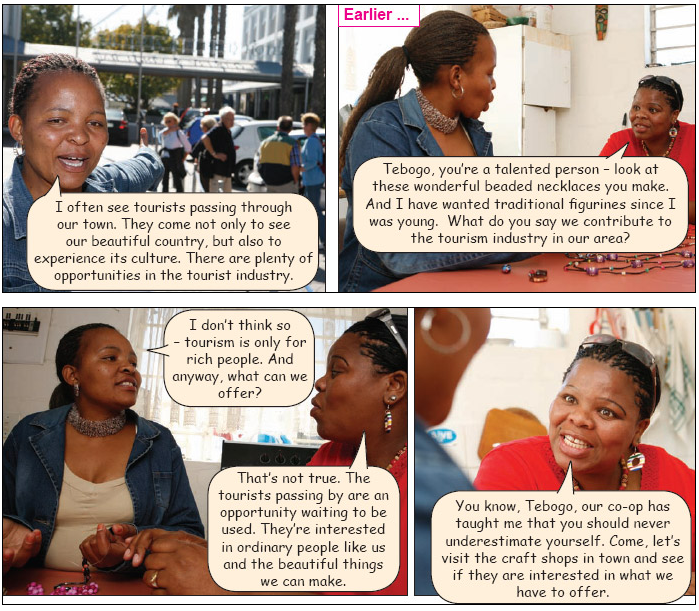
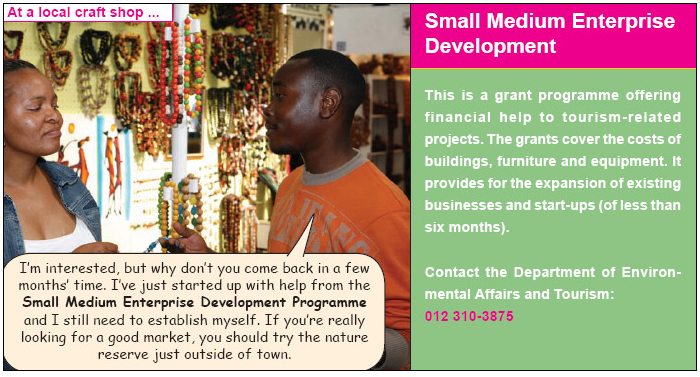
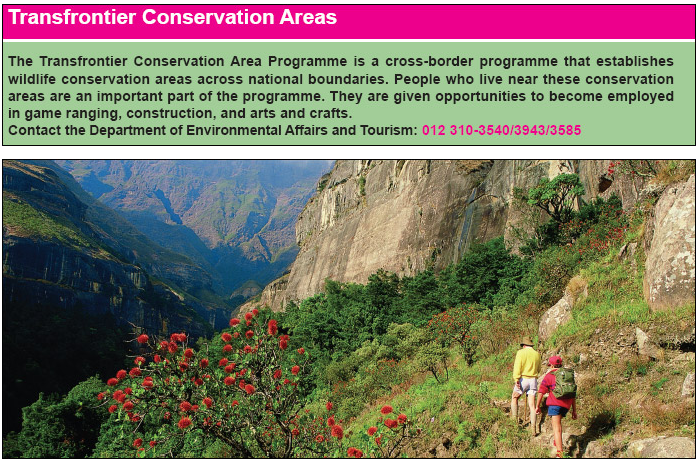
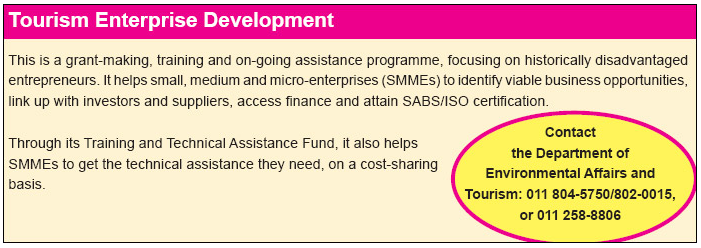
PREPARING TO FACE A BETTER FUTURE
PREPARING TO FACE A BETTER FUTURE sadminSouth Africa is ready to welcome soccer teams from all over the world for the Confederations Cup, which takes place from 14 to 28 June. The  tournament is a scene setter for 2010. It will be a test for South Africa's ability to host a successful Soccer World Cup.
tournament is a scene setter for 2010. It will be a test for South Africa's ability to host a successful Soccer World Cup.
In June this year, the eyes of the world will be on South Africa as we welcome teams and fans from all over the world to the Confederations Cup. A total of 16 matches will be played at four different stadiums.
Many people doubt that South Africa has what it takes to host a successful 2010 World Cup. It is therefore important for South Africans to show the world what we can do.
Warm welcome
The Confederations Cup, as well as the World Cup, is a wonderful opportunity for South Africans to market our country to the world. Visitors who have positive experiences here, will tell others about it. This will lead to more tourists. It will be good for our economy as it creates jobs and brings money into the country.
We have to give all the visitors a warm welcome, be good hosts and make sure that things run smoothly.
FIFA
It is also important for South African fans to behave well and respect FIFA's rules when they attend matches. FIFA has put a lot of confidence in us. They have also put a lot of effort and money into the preparations for the tournaments.
The Confederations Cup and the World Cup are bringing improvements to our roads and other infrastructure. FIFA has also contributed to skills development in South Africa. Let us show our appreciation by staging a grand show to make them proud of us.
- Muzi Mkhwanazi
Volunteers - serving behind the scenes
Almost 5 000 volunteers have been chosen to help with different tasks during the Confederations Cup. They will be ambassadors for South Africa and will play a very important role in giving the world a positive image of our country.
Volunteers will serve in areas like fan parks, transport, information services, hospitality and logistics. Training will include skills like how to receive and treat important guest, how to treat angry fans, understanding the behaviour of fans from different places around the world and answering visitors' queries. They will also learn about the game of football and its culture.
The skills-training programme started at the end of February. Training of volunteers forms part of government's commitment to improving the skills of South Africans through the Joint Initiative for Priority Skills Acquisition (Jipsa). It is also part of the benefits of hosting both the Confederations Cup and the 2010 Soccer World Cup.
Training is taking place in all the host cities of the Confederations Cup. They are Johannesburg, Rustenburg, Pretoria and Bloemfontein.
ROLE MODEL SHE GOT UP AND DID IT FOR HERSELF
ROLE MODEL SHE GOT UP AND DID IT FOR HERSELF sadminWhile her peers went to further their studies at different tertiary institutions after matric, Mosa Moeketsi jumped right into the job market and  made a success. She is now managing her own construction company in Johannesburg.
made a success. She is now managing her own construction company in Johannesburg.
Moeketsi is following in the footsteps of her mother who also owns a construction company.
Plumbing
"It all started five years ago when I finished matric. At the time, I was 15 and decided to have a feel of what the construction industry is all about," said Moeketsi.
Instead of going to a university, Moeketsi completed a one-month course in plumbing. She then joined her mother's company as an intern.
"Our country is facing a serious shortage of skills in many areas and plumbing is one of those. I know that to many young people, especially women, plumbing is a no-go area because it is always linked with waste and dirt, but it's a valuable skill to have," Moeketsi said.
Gardening
After working for her mother's construction company for a year, Moeketsi left and started her own From a plumber into the JOB MARKET, then to SUCCESS gardening and landscaping company. The company did gardening and landscaping in residential areas and in small corporate firms.
"I wanted something more challenging and it was then that I decided to start my own construction company. I have always looked at my mother as a role model. So I said to myself if she can do it, I might as well give it a try."
First job
With only about R1 000 in her bank account, Moeketsi set out to start a company. She had to sell some of her personal belongings to have some extra money to get started.
She then bought tools and hired staff. Her company's first job was to repair low-cost houses.
Awards
Already her work has been noted by various business organisations and government agencies. She has won the Alexandra and Gauteng Business Leader of the Year Awards.
She has also been nominated by the Umsobomvu Youth Fund, the South African Youth Chamber of Commerce and the National African Federated Chamber of Commerce (NAFCOC) for their Youth Entrepreneurship Award.
Skills training
Seeing the serious shortage of skills among young people and school leavers, Moeketsi wants to start a training centre approved by the departments of labour and education. She also plans to give learnerships to school leavers.
"As a young person I know the difficulties faced by the youth. There are limited opportunities available for school leavers. I hope with the planned training centre I can help relieve the skills shortage. I will be working with the Umsobomvu Youth Fund on this project," Moeketsi said.
- Mbulelo Baloyi
SPECIAL EDITION FEATURE 15 YEARS OF DEMOCRACY
SPECIAL EDITION FEATURE 15 YEARS OF DEMOCRACY sadminIn 1994, South Africa's first democratically elected government came into power. Since then, the government has been committed to growing the  country's economy and improving the lives of all its people.
country's economy and improving the lives of all its people.
Special attention has been given to goals like creating jobs, helping the poor, improving service delivery, access to housing, water and electricity, primary health care for all, educating the nation and fighting crime.
Government has made a lot of progress in achieving these goals, but there are still areas where much more can be done. For government to succeed in achieving its goals, it needs the co-operation of all its people. The 15-year review is a study that was done to measure government's delivery of its promises over the past 15 years.
SPECIAL EDITION INDEX
- Building a Healthier Nation
- Developing our Working Skills
- AsgiSA: Towards a strong and Stable Economy
- Winning the War Against Poverty
- Second Economy - Reaching for Higher Goals
- Re-uniting People and the Land
-
We All Benefit when Service is Delivered
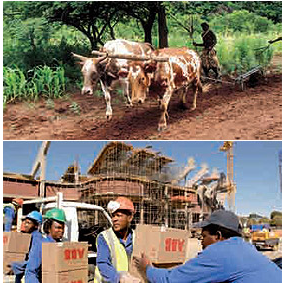
- Safety & Security: Strengthening the Fight Against Crime
- Safety & Security: Getting Tough on Violence
- Unity & Peace in Africa
- Creating a Great Image for a Great Country
- Good Governance: Ensuring our Democracy Runs Smoothly
- Participating in Governance through Izimbizo
- Access to Basic Services: Improving the quality of life
YOUTH BIGGER, BETTER YOUTH ADVISORY CENTRES
YOUTH BIGGER, BETTER YOUTH ADVISORY CENTRES sadminOut of school youth and unemployed graduates around the country are set to benefit from the new services offered by the Youth Advisory Centres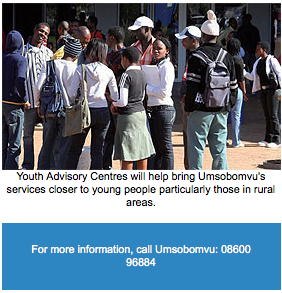 (YACs) of the Umsobomvu Youth Fund.
(YACs) of the Umsobomvu Youth Fund.
The centres offer services for students seeking information on scholarships, learnerships and career advice. They also help unemployed graduates looking for job opportunities or those who want to start their own businesses.
To meet the growing needs of young people, Umsobomvu recently opened a bigger YAC in Nelspruit, Mpumalanga. It offers Umsobomvu's products and services in one building.
Umsobomvu will soon be opening more full-service YACs in Durban, Rustenburg, Witbank and Cape Town, and later in other provinces. This will help bring their services closer to more people.
Starting and growing businesses
So far, the YACs have managed to reach close to 500 000 young people. The addition of new services at these centres will help to reach even more young people.
The Nelspruit YAC will help young people who want to start or grow their businesses and school-leavers or graduates looking for jobs. The YAC staff will also refer young people to suitable employment agencies or youth service providers that can help them find jobs.
In addition, the YAC will help young business people by offering services to help grow their businesses. It will also link them to business or job opportunities. Services will further include helping students to get scholarship, linking them to bursaries, learnerships, volunteerships and internship information. It will provide contact details for educational institutions for those wanting to further their studies.
- Mbulelo Baloyi
YOUTH BIGGER, BETTER YOUTH ADVISORY CENTRES
YOUTH BIGGER, BETTER YOUTH ADVISORY CENTRES sadminOut of school youth and unemployed graduates around the country are set to benefit from the new services offered by the Youth Advisory Centres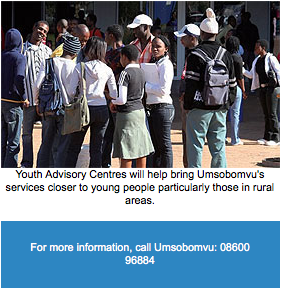 (YACs) of the Umsobomvu Youth Fund.
(YACs) of the Umsobomvu Youth Fund.
The centres offer services for students seeking information on scholarships, learnerships and career advice. They also help unemployed graduates looking for job opportunities or those who want to start their own businesses.
To meet the growing needs of young people, Umsobomvu recently opened a bigger YAC in Nelspruit, Mpumalanga. It offers Umsobomvu's products and services in one building.
Umsobomvu will soon be opening more full-service YACs in Durban, Rustenburg, Witbank and Cape Town, and later in other provinces. This will help bring their services closer to more people.
Starting and growing businesses
So far, the YACs have managed to reach close to 500 000 young people. The addition of new services at these centres will help to reach even more young people.
The Nelspruit YAC will help young people who want to start or grow their businesses and school-leavers or graduates looking for jobs. The YAC staff will also refer young people to suitable employment agencies or youth service providers that can help them find jobs.
In addition, the YAC will help young business people by offering services to help grow their businesses. It will also link them to business or job opportunities. Services will further include helping students to get scholarship, linking them to bursaries, learnerships, volunteerships and internship information. It will provide contact details for educational institutions for those wanting to further their studies.
- Mbulelo Baloyi
YOUTH ENTRENCHING DEMOCRACY: ALL YOUTH TO THE POLLS
YOUTH ENTRENCHING DEMOCRACY: ALL YOUTH TO THE POLLS sadminIn 2008, the National Youth Commission launched Youth Development Month, under the theme "Entrenching democracy: All youth to the polls."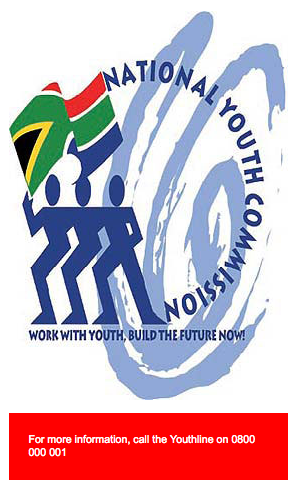 This followed the "ID Urself" campaign. The campaign was run as a partnership between government and other partners to encourage young people to get their identity documents (IDs).
This followed the "ID Urself" campaign. The campaign was run as a partnership between government and other partners to encourage young people to get their identity documents (IDs).
Promoting democracy
It is in this same spirit that the Youth Commission encourages young people to make use of their right and responsibility to cast their vote in the upcoming elections.
Young people are our leaders of the future and by voting they are helping to shape the future. Using their right to vote also means that young people use the opportunity to play an active role in promoting democracy.
Youth Development Agency
Government is in the process of establishing a National Youth Development Agency (NYDA). The aim of the agency is to respond quickly and effectively to the overall needs of young people and the challenges they face.
Voice is heard
It was encouraging that many youth registered to vote. But is important that they should follow this through and go to the polls and entrench democracy. This will ensure that the voice of young people is raised and heard.
YOUTH ENTRENCHING DEMOCRACY: ALL YOUTH TO THE POLLS
YOUTH ENTRENCHING DEMOCRACY: ALL YOUTH TO THE POLLS sadminIn 2008, the National Youth Commission launched Youth Development Month, under the theme "Entrenching democracy: All youth to the polls." 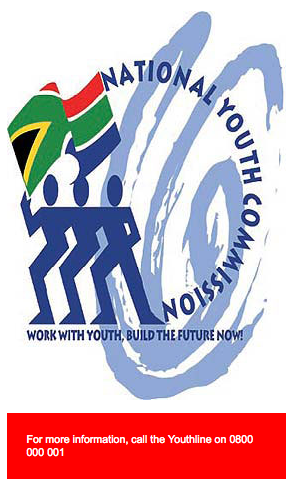 This followed the "ID Urself" campaign. The campaign was run as a partnership between government and other partners to encourage young people to get their identity documents (IDs).
This followed the "ID Urself" campaign. The campaign was run as a partnership between government and other partners to encourage young people to get their identity documents (IDs).
Promoting democracy
It is in this same spirit that the Youth Commission encourages young people to make use of their right and responsibility to cast their vote in the upcoming elections.
Young people are our leaders of the future and by voting they are helping to shape the future. Using their right to vote also means that young people use the opportunity to play an active role in promoting democracy.
Youth Development Agency
Government is in the process of establishing a National Youth Development Agency (NYDA). The aim of the agency is to respond quickly and effectively to the overall needs of young people and the challenges they face.
Voice is heard
It was encouraging that many youth registered to vote. But is important that they should follow this through and go to the polls and entrench democracy. This will ensure that the voice of young people is raised and heard.